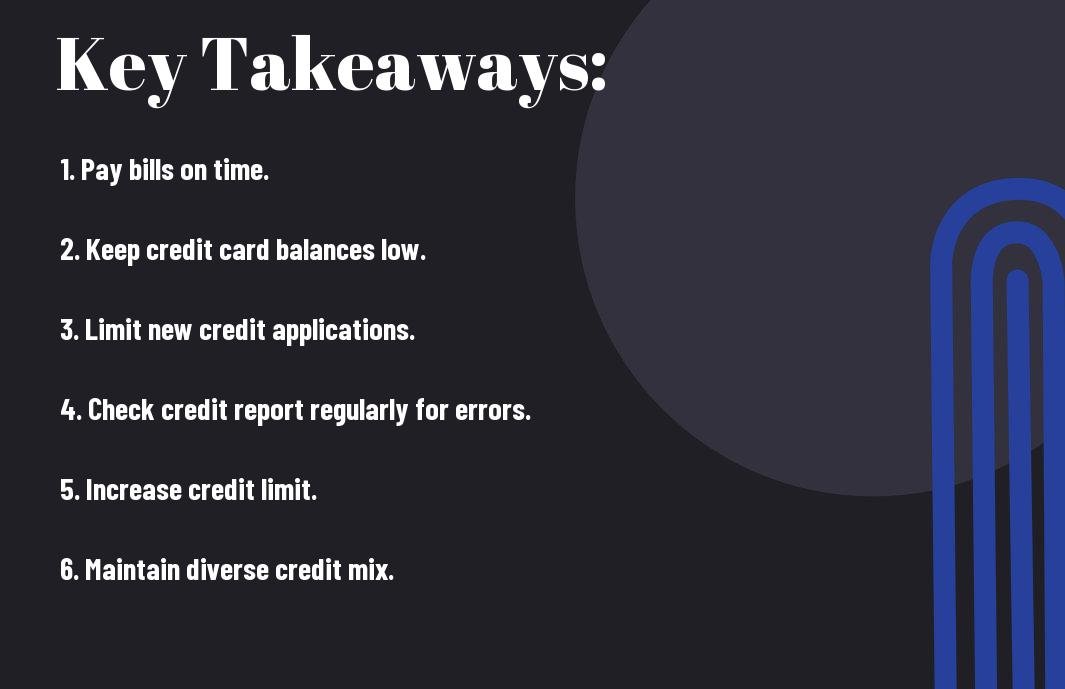It’s time to take control of your financial future by improving your credit score to secure a better mortgage rate. In this top 10 listicle, we’ll explore actionable steps you can take to boost your credit score and increase your chances of getting the mortgage rate you deserve. Let’s dive in and set yourself up for homeownership success!
Key Takeaways:
- Monitor your credit report: Regularly check your credit report for any errors or discrepancies that may be affecting your score.
- Pay your bills on time: Making timely payments on your bills and debts can have a positive impact on your credit score.
- Reduce your credit utilization: Keep your credit card balances low to improve your credit score and qualify for a better mortgage rate.
Review Credit Reports
Check for errors
With your goal of improving your credit score in mind, start by checking your credit reports for any errors. Look for inaccuracies in personal information, payment history, account statuses, and credit limits. It’s important to ensure that your credit reports reflect accurate and up-to-date information.
Dispute inaccuracies
If you spot any inaccuracies on your credit reports, don’t panic. You have the right to dispute any errors with the credit bureaus. By filing a dispute, you can request the removal or correction of any incorrect information that may be negatively impacting your credit score.
Dispute inaccuracies by submitting a formal dispute letter to the credit bureaus, providing evidence to support your claim. Be sure to include copies of any documents that validate your dispute, such as payment receipts or correspondence with creditors. Do not forget, correcting errors on your credit reports can help boost your credit score and increase your chances of qualifying for a better mortgage rate.

Pay Bills Promptly
Clearly, one of the most effective ways to improve your credit score is by paying your bills on time. Late payments can have a significant negative impact on your credit score, so it’s crucial to make sure you pay all your bills promptly.
Set payment reminders
On busy days, it can be easy to forget about upcoming bill payments. Setting up payment reminders on your phone or calendar can help you stay organized and ensure that you never miss a payment deadline.
Automate monthly payments
Payments are a convenient way to ensure that your bills are paid on time every month. By setting up automatic payments for your recurring bills, such as your mortgage, car loan, or credit card payments, you can eliminate the risk of forgetting to make a payment and damaging your credit score.
With automatic payments, the required amount is deducted from your bank account on a predetermined date each month, making it easy to manage your finances and maintain a positive credit history.
Reduce Debt Levels
Pay off balances
Balances on credit cards and other revolving accounts can significantly impact your credit score. By paying off these balances, you can reduce your overall debt levels and improve your credit utilization ratio, which is a key factor in determining your credit score. Make a plan to pay down your debts, starting with high-interest accounts or those with the lowest balances.
Lower credit utilization
Assuming you have credit cards, try to keep your balances well below the credit limit. Lowering your credit utilization shows lenders that you are responsible with your credit and can manage your debts effectively. A good rule of thumb is to aim for a credit utilization ratio of 30% or less. This means if you have a credit limit of $10,000, you should aim to keep your balance below $3,000.
You can also consider requesting a credit line increase on your existing cards, which can help lower your credit utilization ratio as long as you don’t increase your spending. Be mindful of, the lower your credit utilization, the better it is for your credit score.
Avoid New Debts
Limit credit inquiries
Not all credit inquiries are created equal. Some may have a temporary impact on your credit score. Clearly, try to limit the number of inquiries made on your credit report, especially when you are planning to apply for a mortgage. Multiple inquiries within a short period can signal to lenders that you are in need of credit, which may raise red flags.
Postpone new accounts
With a mortgage application on the horizon, it’s best to postpone opening any new credit accounts. While it may be tempting to open a new credit card for a discount or rewards, doing so can increase your overall debt-to-income ratio and potentially lower your credit score. Lenders want to see stability and responsible credit management before approving a mortgage.
Limit the temptation to open new credit accounts by reminding yourself of the bigger goal – securing a better mortgage rate. By delaying new accounts, you can show lenders that you are financially responsible and less risky as a borrower.
Maintain Credit Accounts
Many factors affect your credit score, and one of the imperative ones is how you manage your credit accounts. By understanding the importance of maintaining credit accounts correctly, you can work towards improving your credit score to qualify for a better mortgage rate.
Keep old accounts
Clearly, keeping old accounts open and in good standing can positively impact your credit score. The length of your credit history plays a significant role in determining your creditworthiness, so having older accounts can demonstrate your ability to manage credit responsibly over time.
Manage credit variety
Credit variety refers to the different types of credit accounts you have, such as credit cards, loans, and mortgages. Diversifying the types of credit you use can show lenders that you can handle various financial obligations. This can boost your credit score and increase your chances of qualifying for a better mortgage rate.
With a good mix of credit accounts, you can demonstrate your ability to manage different types of credit responsibly, which can have a positive impact on your credit score.
Consider Loan Types
For individuals looking to improve their credit score to qualify for a better mortgage rate, one crucial step is to consider different loan types. By exploring various options, such as conventional loans, FHA loans, VA loans, and USDA loans, you can determine which type best suits your financial situation and credit score. Importantly, each loan type has specific eligibility requirements and down payment amounts, so it’s vital to research and compare them before making a decision. After evaluating your options, you can choose a loan type that not only helps you qualify for a better mortgage rate but also fits your long-term financial goals.
Explore Loan Options
Loan options play a significant role in determining your credit score and qualifying for a better mortgage rate. By exploring different loan types, such as conventional loans, FHA loans, VA loans, and USDA loans, you can find the one that aligns with your financial needs and credit score. It’s vital to understand the eligibility criteria and down payment requirements for each loan type before making a decision.
Compare Interest Rates
With interest rates being a crucial factor in determining the cost of your mortgage, it’s important to compare rates from different lenders. By researching and comparing interest rates, you can find a lender offering a competitive rate that fits your budget. Keep in mind that even a slightly lower interest rate can result in significant savings over the life of your loan.
Any individual looking to improve their credit score and qualify for a better mortgage rate should carefully consider the loan types available to them. By exploring conventional loans, FHA loans, VA loans, and USDA loans, borrowers can make an informed decision that aligns with their financial goals and credit score. It’s important to compare interest rates from different lenders to ensure that you secure the best possible rate for your mortgage.
Monitor Credit Score
Use credit tools
Unlike in the past, monitoring your credit score is now easier than ever. Some credit tools, such as online platforms and apps, allow you to track your score regularly and provide insights on how to improve it. These tools can be a valuable resource in understanding your financial health and making informed decisions.
Track score changes
An important aspect of improving your credit score is to track changes over time. By keeping an eye on how your score fluctuates, you can identify any unexpected drops and take immediate action to rectify them. Tools that offer credit monitoring services can help you stay on top of any changes and alert you to any potential red flags.
These credit monitoring tools can also provide you with updates on factors that are impacting your score, such as late payments or high credit utilization. By understanding these influences, you can make proactive steps to improve your credit health and qualify for a better mortgage rate.
Responsible Behavior
Budget effectively
Now is the time to take control of your finances by setting up a realistic budget. Start by tracking your monthly income and expenses to see where your money goes. Make necessary adjustments to ensure you are living within your means and have a surplus for savings and debt payments.
Spend within means
With a budget in place, it’s important to stick to it and spend within your means. Avoid splurging on unnecessary items or taking on debt that you can’t afford to pay back. Keep in mind, responsible spending habits will not only help you improve your credit score but also set you up for financial success in the long run.
Behavior: By making conscious decisions about your spending habits and monitoring your budget closely, you can demonstrate responsible behavior to creditors. This shows that you are a reliable borrower who can be trusted with credit, making you more likely to qualify for a better mortgage rate. Keep in mind, every financial decision you make impacts your credit score, so choose wisely.

Consult Credit Counsellor
Seek professional advice
All individuals facing challenges with their credit score should consider seeking professional advice from a credit counselor. These experts can provide personalized guidance on improving credit scores, understanding credit reports, and developing effective strategies to manage debt.
Develop financial plan
Any individual looking to boost their credit score should also focus on developing a solid financial plan. This plan should include creating a budget, prioritizing debt repayments, and setting financial goals. By being proactive and organized with their finances, individuals can make significant strides towards improving their credit score.
Little steps like cutting unnecessary expenses, increasing income, and saving regularly can make a significant impact on one’s financial well-being and credit score over time. By working with a credit counselor to create a tailored financial plan, individuals can set themselves up for success in qualifying for better mortgage rates in the future.
Final Words
Hence, by following the tips outlined in this guide, you can take proactive steps to improve your credit score and qualify for a better mortgage rate. Remember to check your credit report regularly, make payments on time, keep your credit utilization low, and avoid opening new credit accounts unnecessarily. These simple actions can ultimately save you thousands of dollars over the life of your mortgage. With dedication and patience, you can set yourself up for success in securing the best possible mortgage rate for your financial future.
